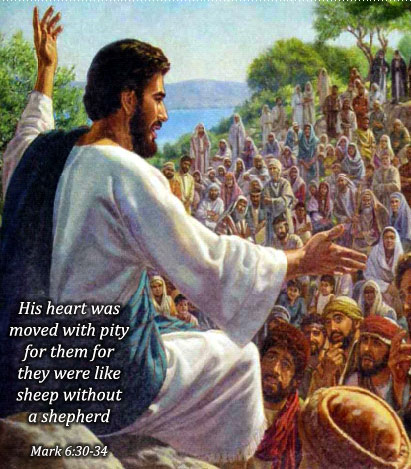|
 A WORD FROM THE PASTOR A WORD FROM THE PASTOR
Reaching Out and Touching
 Mencius, a Chinese philosopher who lived several hundred years before Christ, and was eager to show that there is good in everyone, said, "All people have a capacity for compassion. If people see a child about to fall into a well, they will, without exception, experience a feeling of alarm and distress. This is not because they know the child's parents, nor out of desire for praise… nor out of dislike for the bad reputation that would ensue if they did not go to the rescue. From this we may conclude that without compassion one would not be a human being." Mencius, a Chinese philosopher who lived several hundred years before Christ, and was eager to show that there is good in everyone, said, "All people have a capacity for compassion. If people see a child about to fall into a well, they will, without exception, experience a feeling of alarm and distress. This is not because they know the child's parents, nor out of desire for praise… nor out of dislike for the bad reputation that would ensue if they did not go to the rescue. From this we may conclude that without compassion one would not be a human being."
Mencius was right to say that compassion is a component of true humanity, but alas, recent wars have shown us that there are also those who would as soon throw a child into a well as to pull one out. Some people are so self-occupied that they don't even notice those who are suffering. The compassion of which we are capable needs cultivating if it is to find expression. Following Christ is one way to nurture that characteristic. A catholic writer said: "You will have found Christ when you are concerned with other people's sufferings and not your own."
The beginning of compassion involves becoming aware of the suffering of others. But it is not enough simply to see the suffering of others, we need to feel it. It is not enough to feel sympathy for someone who is suffering, but empathy (the ability to understand and share the feelings of another). In today’s gospel, we see Jesus attending to his weary apostles, who have just returned from their first preaching mission, while at the same time expressing his concern for the people who, like “sheep without a shepherd," have gathered to meet him in the wilderness. Jesus reached out to people and touched them. He had compassion. Jesus not only had sympathy for the people, but also empathy.
Jacob Bronoski, in his landmark television documentary, The Ascent of Man, revealed how medicine progressed in its development as a science. In the beginning, the doctors would read the great classics of healing, but would never touch the patient. He would direct a lowly surgeon to make the incision in the patient. Real healing didn't take place, until one doctor had the courage to actually touch his patient. “You see, you can't heal them till you touch them”, he said.
Let us heal the wounds of others through our gentle touch of prayer, kind words and good works. Let us express our compassion to those who are away from the church by taking steps to reach out to them and tell them the need for God and church in their lives.
In the Service of the Lord,
Father Thainese Alphonse |
|
The Days are Coming
Separation, isolation, and hostility are terrible things. We are, sadly, too familiar with all of them in our modern life, whether we look at world events or events in our own neighborhoods and families. All three readings today refer to these same sad human conditions.
The prophet Jeremiah describes world conditions as if the people of his time were sheep who had been scattered by poor leadership and corrupt shepherds. But “the days are coming,” he assures us (Jeremiah 23:5), when a new shepherd, a just king, will come. We meet that king in the second reading and the Gospel. Paul reminds us in the Letter to the Ephesians that all divisions can now cease in Christ Jesus, who has brought us together through his blood. In Mark’s Gospel we see Jesus himself, looking with pity on those searching for him as if they were sheep without a shepherd.
|